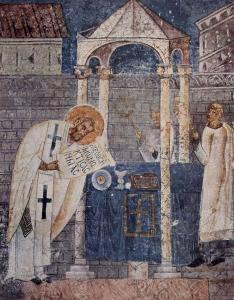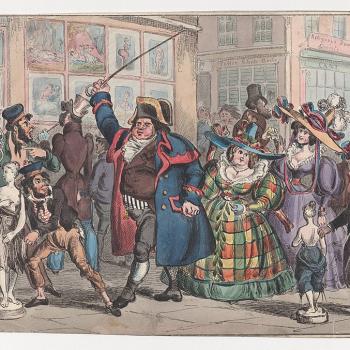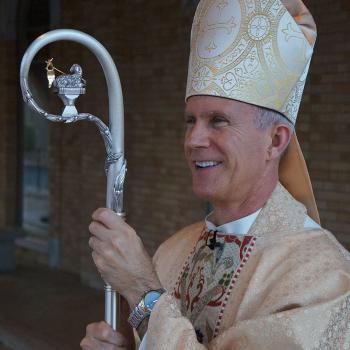 Saint Basil the Great once challenged his listeners by asking them, “How can I bring the sufferings of the poor to your attention, so that you might realize from what misery you are collecting riches for yourself?” [1]
Saint Basil the Great once challenged his listeners by asking them, “How can I bring the sufferings of the poor to your attention, so that you might realize from what misery you are collecting riches for yourself?” [1]
This challenge was one which he knew personally. He was raised as a member of a large, wealthy Christian family. His family’s resources allowed him to receive a great education in Caesarea Mazaca, Constantinople, and Athens, before engaging a practice of law and teaching rhetoric back n Caesera. But he would soon figure out it was not what he was meant to do: he felt the call of God upon his life, received baptism, and become an ascetic, divesting himself of worldly goods, giving what he could to the poor. While the ascetic life was his calling, he soon found it was not to be as a solitary ascetic, and so he began and formed a monastic community, bringing his friend, St. Gregory the Theologian, briefly into the community with him. When he spoke of the need to take care of the poor, he spoke out of personal experience, as he helped give to the poor and needy during times of famine, cooking for them so that they would have something to eat. Of course, he also found himself, with his friend St. Gregory the Theologian, and his brother St. Gregory of Nyssa, drawn into the Arian controversy, writing not only in defense of the Nicene definition with its declaration that Jesus is God, but also writing, often with subtly, a response to those who questioned the divinity of the Holy Spirit.[2] His work with St Gregory the Theologian and St Gregory of Nyssa in promoting the Nicene faith helped provide the theological terminology needed to properly discuss the Trinity. Indeed, their combined contribution to Christian terminology would be enough to demonstrate the importance of St. Basil for the Christian tradition. Nonetheless, as his work with monasticism helped establish the foundations by which many monastic communities, especially in the Byzantine tradition, are formed and governed, his influence on Christian history should unquestionable. But what about his moral teachings? Though often found in his homilies and scriptural commentaries, they are also of great value, and should not be something regulated as secondary to our understanding of St. Basil and what he taught. Indeed, unlike his doctrinal or monastic writings, as his moral writings are something which could be much more appreciated by the ordinary Christian, and not just theological scholars or monks, so that for those wanting to learn some of his wisdom, approaching him through some of the prudential is a good way to appreciate him and what he offers to Christians, not just in his time, but for all ages.
As was demonstrated in the opening quote, St. Basil was greatly concerned about the plight of those suffering from poverty. He famously told his listeners that the possessions they have in excess comes as a result of taking away from the poor what they otherwise need:
The bread you are holding back is for the hungry, the clothes you keep put away are for the naked, the shoes that are rotting away with disuse are for those who have none, the silver you keep buried in the earth is for the needy. You are thus guilty of injustice toward as many as you might have aided, and did not.[3]
Likewise, he realized that what he was speaking of might not be popular with the masses, because they liked to argue against big sins which they did not participate in like murder, but did not want to be challenged for the evil which they do or allow to continue:
There are many who pursue the adulation of the masses: in their actions they prefer injustice and avarice, as if these were beneficial, whereas in outward appearance and in their conversations they express great admiration for equality and justice. [4]
Such injustice had become the norm, and generally accepted, so that it was what needed to be opposed by Christians:
A very wicked convention, however, leads us astray and a perverted human tradition is the source of great evil for us; I mean that tradition according to which some sins are denounced and others are viewed indifferently. Crimes like homicide and adultery are the object of a violent but feigned indignation, while others, such as anger or reviling or drunkenness or avarice, are not considered deserving of even a simple rebuke. [5]
Care should be had for those in need, and they should not be looked down upon because they need such aid:
Now as for reproaching poverty, low birth, ignorance, or physical disability, this is utter irrational and alien to the virtuous man. And in the case of involuntary disadvantages, it is appropriate to show mercy on the unfortunate rather than to mistreat them.[6]
And this care is not to be given merely on an individual level. We are called to a social, indeed, civic form of life, and so our compassion, our care for those in need, indeed, for all, should be done by society as a whole:
Scripture exhorts us to community, mutual charity, and what is proper to our nature. For a human being is a civic and social animal. Because our life is communal and we pass our lives with one another, generosity in improving the lot of those in need is necessary.[7]
Like a good pastor, Basil understood the distinction between voluntary and involuntary sins, indicating that we must distinguish the gravity of the sin based upon intention and not just its objective value. We must avoid over-arching legalistic narrative in regards to our treatment of sin, and instead, justly apply pastoral care in determining what is the just response: “In addition, since some sins are involuntary and others are from a wicked intention, there is no single rule for applying justice in both cases.”[8]
What Paul wrote to the Colossians can be seen as an indicator of St. Basil’s moral theology:
See to it that no one makes a prey of you by philosophy and empty deceit, according to human tradition, according to the elemental spirits of the universe, and not according to Christ. For in him the whole fulness of deity dwells bodily, and you have come to fulness of life in him, who is the head of all rule and authority. In him also you were circumcised with a circumcision made without hands, by putting off the body of flesh in the circumcision of Christ; and you were buried with him in baptism, in which you were also raised with him through faith in the working of God, who raised him from the dead (Col. 2:8-12 RSV).
St. Basil fought against those who tried to subvert Christianity but undermining or ignoring the dictates of Christ. Everything Basil spoke about in regards morality stemmed from his understanding of the teachings of Christ. He sought to elucidate them, making sure his listeners could understand what Christ was asking of them. Those who had not been challenged to fulfill the radical nature of Jesus’ teachings, thinking all they needed was right belief, found St. Basil telling them to think otherwise: “That even if a man seem to confess the Lord and hear His words, but does not obey His commands, he is condemned, even though, by some divine concession, he be vouchsafed an endowment of spiritual gifts.”[9] And this, St Basil said, was found in the way we should love our neighbors, showing compassion to them, “That we should be compassionate and generous; for they who are not such are denounced.”[10] And so he also said:
By these words in fact he taught that every human being is to be thought of as our neighbor. Now this is something hard to do. And we must take great care not to mistreat our neighbor in matters small and great, not to hurt him by our words, nor to deprive him of any of his possessions, not to wish him evil, not to be jealous of the successes of our neighbors.[11]
Today, as in Basil’s time, we need to hear this message. We need to be challenged. We need to stop thinking about those sins we see in others and instead focus on our own sins. If sexual sins are not our thing, but avarice is, then we should remember the great evil which is found in avarice: for the love of money is the root of all evil. Such greed, St. Basil reminds us, will destroy us like a fire:
Do not compound your sin. For the illness of greed is never stable but like the nature of fire. For as soon as a fire is kindled by a fanning wind, it rushes to feed upon all the wood that it can, and no one can stop it until the wood is gone. What can hold the greedy man in check? He is more cruel than fire, consuming everything, never ceasing. [12]
We must, therefore, heed what St. Basil said is to be a part of the Christian life. We need more than the right faith (though that, of course, is important). We need to truly act on it. We need to follow what Christ told us to do without excuse. We need to die to ourselves so that we can truly pick up our cross, and come follow Christ wherever he shall lead. St. Basil was challenged to do that and he met the challenge be becoming a monk (and later, a bishop). He is remembered today because he lived out the Christian life with great fidelity to Christ, a fidelity which was not just in thoughts and words, but also deeds, as the Kontakion for his feast tells us:
Thou wast an unshaken foundation of the Church and didst give to all mortals an inviolate lordship which thou didst seal with thy doctrine, O righteous Basil, revealer of the mysteries of heaven (Kontakion of St. Basil the Great).
[IMG=Saint Basil by Meister der Sophien-Kathedrale von Ohrid [Public domain], via Wikimedia Commons]
[1] St. Basil, “I will Tear Down My Barns” in On Social Justice. Trans. C. Paul Schroeder (Crestwood, NY: St Vladimir’s Seminary Press, 2009), 70.
[2] While On the Holy Spirit is a fundamental treatise on the divinity of the Holy Spirit, the way St. Basil demonstrates the Spirit’s divinity is indirectly, hoping the reader will make explicit what he left implicit.
[3] St. Basil, “I will Tear Down My Barns,” 70.
[4] St. Basil, “Homily on the Beginning of Proverbs” in On Christian Doctrine and Patrice. Trans. Mark DelCogliano (Crestwood, NY: St. Vladimir’s Seminary Press, 2012), 63.
[5] St. Basil, “On the Judgment of God” in St. Basil: Ascetical Works. Trans. Sister M. Monica Wagner, CSC (New York: Fathers of the Church, Inc., 1950), 49.
[6] St. Basil, “Homily on Psalm 14” in On Christian Doctrine and Patrice. Trans. Mark DelCogliano (Crestwood, NY: St. Vladimir’s Seminary Press, 2012), 98.
[7] St. Basil, “Homily on Psalm 14,” 100.
[8] St. Basil, “Homily on the Beginning of Proverbs,”64.
[9] St. Basil, “The Morals” in St. Basil: Ascetical Works. Trans. Sister M. Monica Wagner, CSC (New York: Fathers of the Church, Inc., 1950), 80 [ Rule Seven].
[10] St. Basil, “The Morals.” 125 [Rule Forty-Eight].
[11] St. Basil, “Homily on Psalm 14,” 97.
[12] St. Basil, “Homily Delivered in Lakizois” in On Christian Doctrine and Patrice. Trans. Mark DelCogliano (Crestwood, NY: St. Vladimir’s Seminary Press, 2012), 202.
Stay in touch! Like A Little Bit of Nothing on Facebook













